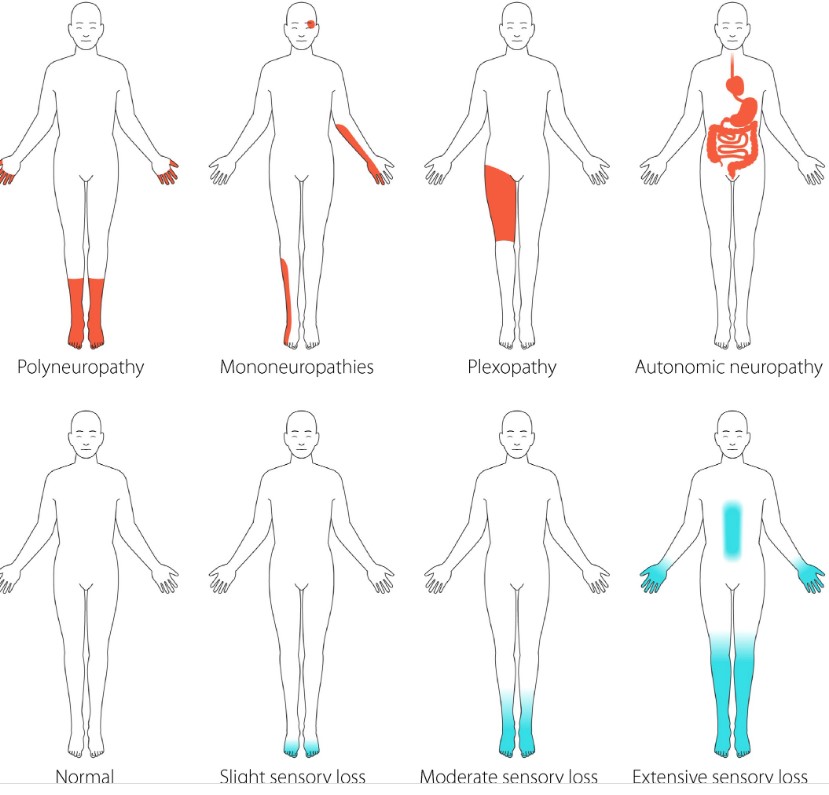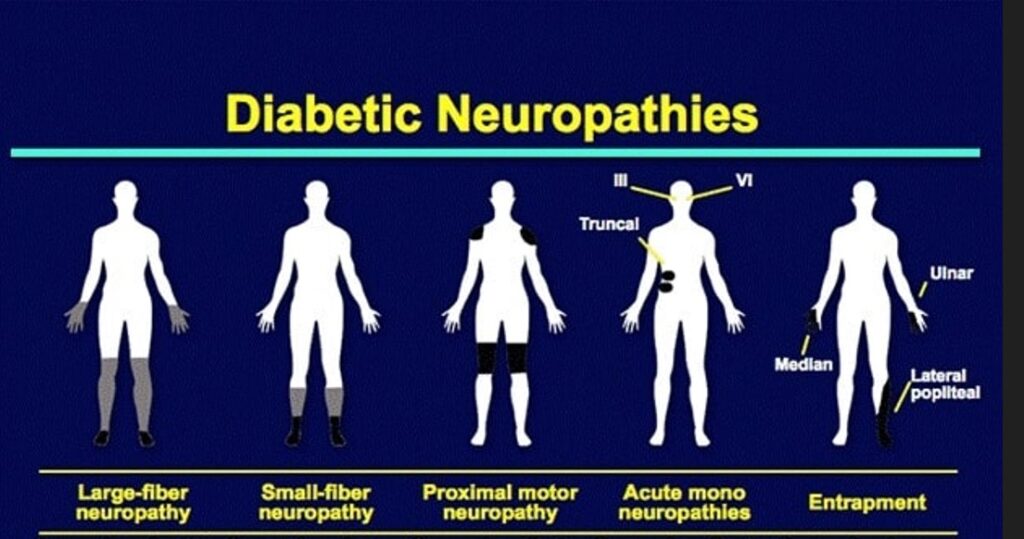DIABETIC NEUROPATHY

What Is Diabetic Neuropathy?
Diabetes can harm your nerves. That damage, called neuropathy, may be painful.
It can happen in several ways, and they all seem to be related to blood sugar levels being too high for too long. To prevent it, work with your doctor to manage your blood sugar.


You may hear your doctor mention the four types of diabetes-related neuropathy: peripheral, autonomic, proximal, and focal.
Peripheral Neuropathy
This type usually affects the feet and legs. Rare cases affect the arms, abdomen, and back.
Symptoms include:
- Tingling
- Numbness (which may become permanent)
- Burning (especially in the evening)
- Pain
Early symptoms usually get better when your blood sugar is under control. There are medications to help manage the discomfort.
What you should do:
- Check your feet and legs daily.
- Use lotion on your feet if they’re dry.
- Take care of your toenails. Ask your doctor if you should go to a podiatrist.
- Wear shoes that fit well. Wear them all the time, so your feet don’t get injured.
Autonomic Neuropathy
This type usually affects the digestive system, especially the stomach. It can also affect the blood vessels, urinary system, and sex organs.
In your digestive system:
Symptoms include:
- Bloating
- Diarrhea
- Constipation
- Heartburn
- Nausea
- Vomiting
- Feeling full after small meals
What you should do: You may need to eat smaller meals and take medication to treat it.
In blood vessels:
Symptoms include:
- Blacking out when you stand up quickly
- Faster heartbeat
- Dizziness
- Low blood pressure
- Nausea
- Vomiting
- Feeling full sooner than normal
If you have it: Avoid standing up too quickly. You may also need to wear special stockings (ask your doctor about them) and take medicine.
In Men:
Symptoms include: They may not be able to have or keep an erection, or they may have “dry” or reduced ejaculations.
What you should do: See your doctor, because there are other possible causes than diabetes. Treatment includes:
- Counselling
- Penile implant or injections
- Vacuum erection device
- Medication
In Women:
Symptoms include: Can include less vaginal lubrication and fewer or no orgasms.
What you should do: See your doctor. Treatments include:
- Vaginal estrogen creams, suppositories, and rings
- Medications to help sex not feel painful
- Lubricants
In the Urinary System:
Symptoms include:
- Trouble emptying your bladder
- Bloating
- Incontinence (leaking urine)
- More bathroom trips at night
What you should do: Tell your doctor. Treatments may include:
- Medication
- Inserting a catheter into the bladder to release urine (self-catheterization)
- Surgery
Proximal Neuropathy
This type causes pain (usually on one side) in the thighs, hips, or buttocks. It can also lead to weakness in the legs.
Most people with this condition need treatment, such as medication and physical therapy, for their weakness or pain.
Focal Neuropathy
This type can appear suddenly and affect specific nerves, most often in the head, torso, or leg. It causes muscle weakness or pain.
Symptoms include:
- Double vision
- Eye pain
- Paralysis on one side of the face (Bell’s palsy)
- Severe pain in a certain area, such as the lower back or leg(s)
- Chest or belly pain that is sometimes mistaken for another condition, such as heart attack or appendicitis
What you should do: Tell your doctor about your symptoms. Focal neuropathy is painful and unpredictable. But it tends to improve by itself over weeks or months. It usually doesn’t cause long-term damage.
Other Diabetes Nerve Damage
People with diabetes can also get other nerve-related conditions, such as nerve compressions (entrapment syndromes).
Carpal tunnel syndrome is a very common type of entrapment syndrome. It causes numbness and tingling of in the hand and sometimes muscle weakness or pain.
If you think you may have any type of nerve problem, talk with your doctor, so they can check for the cause.
Peripheral Neuropathy and Diabetes
If you have diabetes and peripheral neuropathy, it’s critical that you carefully control your blood sugar levels. High blood sugar levels over time damage the blood vessels and nerves in your legs and feet. Fortunately, a good diet and regular, moderate-intensity exercise can help improve your body’s use of insulin.
Adopting healthy eating and exercise habits is important because it keeps blood sugar levels under control. In addition, studies show that lifestyle changes can prevent the development and slow the progression of neuropathy. And exercises that improve circulation, like walking, can help relieve pain.
To change your lifestyle and help peripheral neuropathy:
- Get regular physical activity. Ask your doctor for an exercise routine that is right for you. Aside from helping you reach and maintain a healthy weight, exercise also improves the body’s use of insulin and improves circulation. It also strengthens muscles, which improves coordination and balance. Your doctor can get you started on an exercise program that won’t be hard on your feet – such as walking, swimming, biking, or yoga. You may need to limit exercises that are hard on your feet, such as running or aerobics. People with neuropathy — especially those with bone deformities — should always wear well-fitted shoes to avoid pressure sores and ulcers on the foot.
- If you smoke, stop.Smoking makes circulatory problems worse, and it worsens the symptoms of peripheral neuropathy. It also greatly increases the risk of heart disease in people with diabetes. Talk to your doctor about ways to quit smoking. Often, people turn to counseling and drug therapy such as nicotine patches, gum, prescription medication, or other aides. Antidepressants can also help reduce cravings and help control pain from neuropathy at the same time.
- Carefully limit alcohol. Alcohol can worsen peripheral neuropathy and make it hard to control your blood sugar levels.
Diet and Peripheral Neuropathy
To keep blood sugar under control, it’s important to follow the right meal plan. A well-balanced diet can make a big difference. You might want to consult with your doctor or a dietitian to learn what foods are best, when to eat, how much to have of each, and what to avoid.
You will need to keep close track of the carbohydrates you eat because they have the most immediate effect on your blood sugar. Carbohydrates are found in:
- Breads
- Pasta
- Cereal
- Milk, yogurt, and other dairy products
- Candy, cake, cookies, ice cream (desserts)
- Processed foods (most have sweeteners)
- Fruits
- Fruit juices
- Rice and grains
- Starchy vegetables
You should eat plenty of fiber. Fiber plays a role in the digestive process and delays sugar absorption. Choose from:
- Fresh fruits and vegetables
- Cooked dried beans and peas
- Whole-grain breads, cereals, and crackers
- Brown rice
- Bran products
It’s important to eat foods that are low in animal fat. Good choices are:
- Lean meats. Bake, broil, grill, roast, or boil — never fry.
- Low-fat dairy. That includes low-fat cheese, milk, and yogurt.
Avoid high-salt foods, which can cause high blood pressure:
- Salt
- Boxed mixes of potatoes, rice, pasta
- Canned meats
- Canned soups and vegetables
- Processed and packaged foods (lunch meat, sausage, bacon, ham)
- Salty snack foods such as chips and Monaco biscuits
